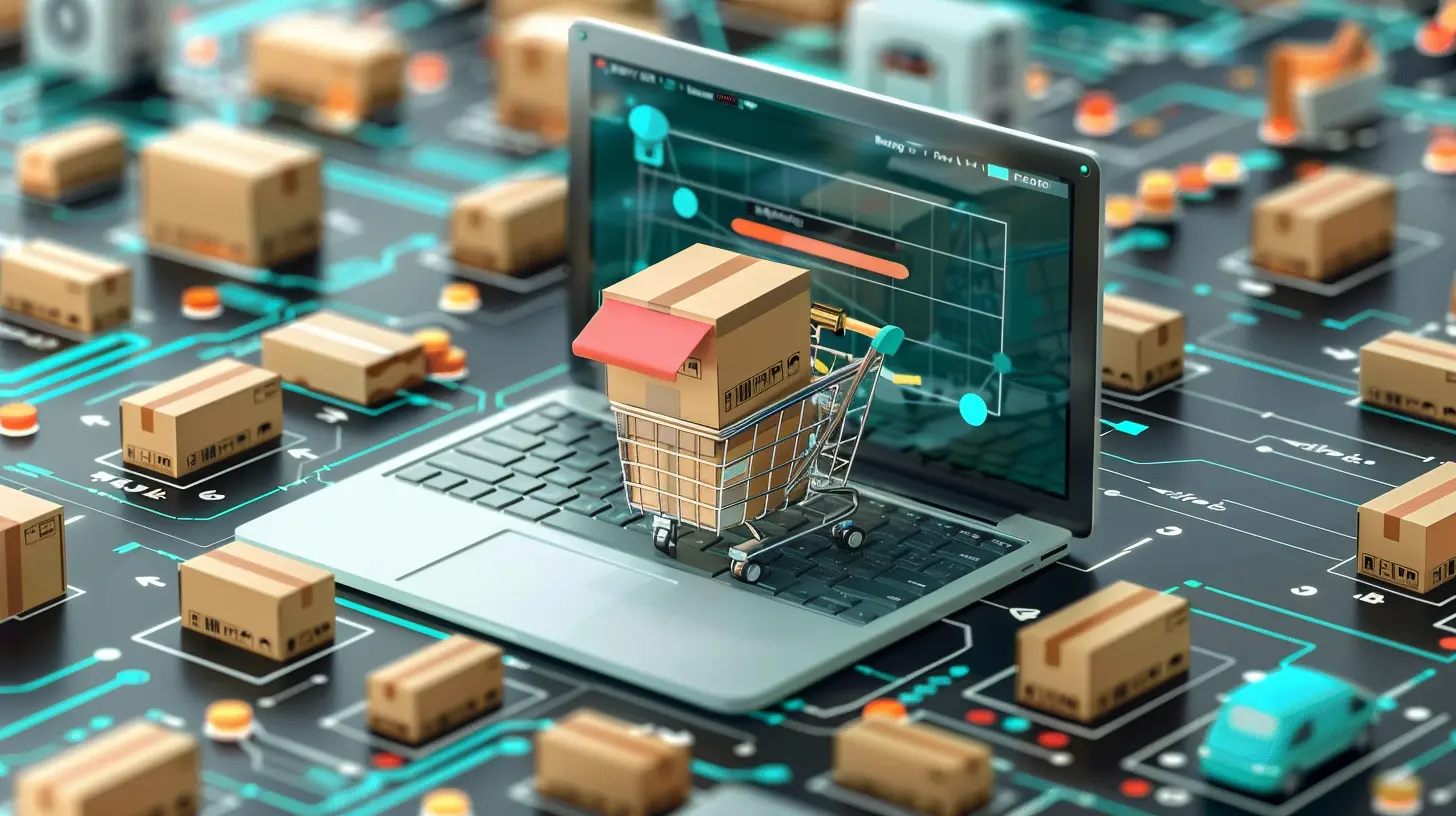How Blockchain Can Strengthen Customer Trust in E-commerce
31 August 2025
Let’s be honest—e-commerce has come a long way. A few years ago, the idea of buying a couch or a luxury watch online seemed absurd. Now? We’re doing it daily. But here’s the thing: even as e-commerce grows, trust issues still linger. From sketchy sellers to fake reviews and data breaches, customers are rightfully skeptical. So, how do we fix this trust gap?
One word: blockchain.
Yep, that same technology behind Bitcoin has way more to offer — especially when it comes to building rock-solid trust in the e-commerce world. In this article, we’re diving deep into how blockchain can actually turbocharge customer trust and change online shopping for the better.
What Is Blockchain, Anyway?
Before we get ahead of ourselves, let’s first unpack what blockchain actually is. You’ve probably heard the term thrown around like digital confetti, but how does it work?At its core, blockchain is a decentralized, digital ledger. Think of it as a massive Google Sheet, but spread across thousands of computers instead of living on one server. Every time a transaction happens, it gets recorded in a block. Once filled, new blocks get added chronologically, forming—you guessed it—a chain of blocks.
But here’s the magic sauce:
- Each block is immutable (that means once data is recorded, it can’t be changed).
- It’s decentralized, so no single entity controls it.
- It’s transparent, allowing anyone in the network to see transactions.
Sounds like a solid recipe for trust, right?
The Trust Issue in E-commerce
Let’s talk about the elephant in the digital room: trust. Or rather, the lack of it.Customers worry about:
- Is my payment information safe?
- Will I actually receive what I ordered?
- Are these product reviews even real?
- What if I get scammed, who’s got my back?
These are valid concerns. Trust is the currency of online shopping — without it, carts get abandoned, and brands lose loyal customers. Traditional security measures help, but they’re often reactive (think refunds after the damage is done).
That's where blockchain can flip the script.
How Blockchain Can Build Rock-Solid Trust
Alright, now that we understand the basics, let’s roll up our sleeves and get into the juicy stuff — how blockchain can really strengthen customer trust in e-commerce.1. Transparent Transactions
Ever ordered something online and got something completely different—or worse, nothing at all? It’s frustrating. But with blockchain, every transaction is recorded and visible on a public ledger. That means you, the customer, can trace the product’s journey, from production to delivery.Imagine being able to check where your organic coffee beans were grown, who packaged them, and when they shipped — all verified on the blockchain.
No more smoke and mirrors. Just pure, unfiltered transparency.
2. Authentic Product Verification
Counterfeit products are a huge problem in e-commerce. High-end brands lose billions every year, and customers often end up with knock-offs. Blockchain can solve that.How? With digital certificates of authenticity stored on the blockchain. Every product can come with a unique blockchain ID, making it easy for customers to verify if it’s the real deal.
Think of it like a birth certificate for each product—unchangeable, public, and 100% legit.
3. Secure Customer Data & Privacy
Data breaches. Just hearing the words is enough to make anyone sweat. In traditional models, companies store your data in centralized databases. If hackers break in, it’s game over.But blockchain stores data securely and in a decentralized way, making it nearly impossible for hackers to tamper with or steal customer info. Plus, customers can have more control over their own data, choosing what to share and with whom. That’s a huge win in a time where privacy concerns are sky-high.
4. Real Reviews You Can Actually Trust
Fake reviews are the bane of online shopping. One minute you think you're buying a 5-star blender, the next you're stuck with a noisy paperweight. Blockchain has the power to authenticate reviews by tying them to verified purchases.What does that mean? Only people who actually bought the product can leave a review — and that review gets logged permanently on the blockchain. No shady bots. No fake accounts. Just honest feedback from real people.
5. Decentralized Marketplaces
Ever felt like you’re just at the mercy of big e-commerce platforms? You’re not alone. But through blockchain, we could see the rise of decentralized marketplaces — platforms not controlled by one single authority, but governed by smart contracts and community consensus.This means fairer pricing, fewer middlemen, and more transparency on every level — from pricing to shipping to customer service.
Smart Contracts: Automating Trust
Let’s talk about smart contracts for a second—because they’re a total game-changer.A smart contract is a self-executing contract where the terms are written into code. Think of it like an online vending machine: you put in your money (crypto, in this case), and the machine automatically gives you your snack (or product). No human needed, no room for shady business.
In e-commerce, smart contracts can:
- Auto-process refunds if a product isn’t delivered.
- Trigger payments only once the customer confirms receiving the item.
- Handle warranties without needing a call center or a mountain of paperwork.
The best part? Smart contracts live on the blockchain, so they’re locked in and tamper-proof. That’s automation you can actually trust.
Blockchain and Supply Chain Transparency
Here’s another angle where blockchain can shine: the supply chain.As a customer, you probably don’t think about how your new pair of sneakers got to your doorstep. But the supply chain affects:
- Product quality
- Delivery times
- Ethical sourcing
- Environmental impact
Blockchain makes the entire supply process visible and traceable, so customers can see exactly where and how their products were made. Was the cotton ethically sourced? Did factory workers get fair pay? With blockchain, it’s all out in the open.
Talk about putting your money where your values are.
A Boost for Brand Loyalty
People stick with brands they trust—it’s human nature. When businesses adopt blockchain to enhance transparency, data security, and product authenticity, they send a loud and clear message: "We have nothing to hide."That message? It builds loyalty.
Customers are way more likely to come back (and spread the word) when they feel safe and valued. Trust isn’t just good ethics—it’s good business.
Real-World Examples
Okay, let’s get out of theory and into real life. Blockchain isn't just a buzzword anymore; it’s already being used by leading brands and platforms.- Walmart is using blockchain to track food origins, improving safety and transparency.
- LVMH, the luxury brand group, uses blockchain to authenticate designer products.
- OpenBazaar is a decentralized marketplace where transactions are governed by blockchain tech and smart contracts.
These companies are setting the stage—and proving that blockchain isn't just hype, but a real tool to build trust.
The Future of E-commerce Is Transparent
We’ve touched on a lot today—fake reviews, sketchy sellers, data breaches—basically everything that makes online shopping stressful. But blockchain has a solution for each of these problems.In a world where customers are increasingly skeptical, trust is the ultimate competitive edge. Businesses that embrace blockchain aren’t just upgrading their tech—they’re upgrading the entire customer experience.
Would you rather buy from a mystery seller or from a transparent brand that shows you every step of the product journey?
Exactly.
Final Thoughts
Blockchain might still seem like a complex beast, but don’t be intimidated. At the end of the day, it’s just a powerful tool that can make e-commerce safer, smarter, and more trustworthy.We’re heading toward a future where customers won’t just hope they can trust an online brand — they’ll have the tools to verify it, thanks to blockchain.
And in that future? Everyone wins.
all images in this post were generated using AI tools
Category:
Blockchain In BusinessAuthor:

Baylor McFarlin
Discussion
rate this article
1 comments
Wren Harper
Imagine a world where every transaction is transparent yet untraceable. As blockchain blurs the lines between privacy and trust, e-commerce could revolutionize how we perceive buying online. Are you ready?
September 14, 2025 at 3:31 AM

Baylor McFarlin
Absolutely! A transparent yet untraceable system could enhance trust in e-commerce by ensuring privacy while maintaining accountability, paving the way for a more secure shopping experience.


